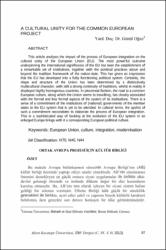| dc.contributor.author | Oğuz, Gönül | |
| dc.date | 2015-01-13 | |
| dc.date.accessioned | 2015-01-13T14:28:52Z | |
| dc.date.available | 2015-01-13T14:28:52Z | |
| dc.date.issued | 2013-12 | |
| dc.identifier.citation | Oğuz, G , , . (2013). A cultural unity for the Common European Project . Afyon Kocatepe Üniversitesi İktisadi ve İdari Bilimler Fakültesi Dergisi , 15 (2) , 87-101 | |
| dc.identifier.issn | 1302-1966 | |
| dc.identifier.uri | http://hdl.handle.net/11630/1515 | |
| dc.identifier.uri | https://dergipark.org.tr/tr/pub/akuiibfd/issue/1618/20256 | |
| dc.description.abstract | This article analyses the impact of the process of European integration on the cultural unity of the European Union (EU). The most powerful outcome underpinning the international significance of the EU has been the establishment of a remarkable set of institutions, together with the political practices above and beyond the tradition framework of the nation-state. This has given an impression that the EU has developed into a fully functioning political system. Certainly, the shape and structure of the Union has been determined by a distinctively multicultural character, with still a strong continuity of traditions, whilst in reality it displayed highly homogenous countries. In piecemeal fashion, the road to a common European culture, along which the Union seems to travelling, has closely associated with the formal and less formal aspects of the system of its institutions. There is a sense of a commitment of the institutions of (national) governments of the member states to the EU system that is yet to be attended. In cultural terms, the upshot of such a commitment neccesitates to elaborate the process of European integration. This is a sophisticated way of looking at the evolution of the EU system in an enlarged Europe brings with it a corresponding European political culture. | en_US |
| dc.description.abstract | Bu makale Avrupa bütünleşmesi sürecinin Avrupa Birliği’nin (AB) kültür birliği üzerinde yaptığı etkiyi analiz etmektedir. AB’nin uluslararası önemini destekleyen en güçlü sonucu siyasi uygulamalar ile birlikte ulus- devlet geleneği ötesinde ve üstünde dikkate değer bir dizi kurumların kuruluş olmasıdır. Bu, AB’nin tam olarak işleyen bir siyasi sistem haline geldiği bir izlenim vermiştir. Elbette Birliği hâlâ güçlü bir süreklilik gelenekleri ile birlikte, ayırt edici şekil ve yapısını birçok kültürlü karakteri belirlemiş iken gerçekte son derece homojen bir ülke görünümündedir.Görünüşte adım adım ortak bir Avrupa kültürüne doğru alınan yol kurumlar sisteminin resmi ve daha az resmi yönleri ile yakından ilişkilidir. Üye (ulusal) devletlerin henüz katılacağı AB sisteminin kurumlarına bir bağlılık duygusu vardır. Kültürel açıdan sonuçta bu kararlılık Avrupa bütünleşme sürecini ayrıntılı incelenmesini gerekli kılmaktadır. Bu genişlemiş Avrupa'daki bir Avrupa siyasi kültürüne karşılık gelen AB sisteminin evrimine entellektüel yönünden bakılmasıdır. | en_US |
| dc.language.iso | eng | en_US |
| dc.publisher | Afyon Kocatepe Üniversitesi | en_US |
| dc.rights | info:eu-repo/semantics/openAccess | en_US |
| dc.subject | European Union | en_US |
| dc.subject | Culture | en_US |
| dc.subject | Integration | en_US |
| dc.subject | Modernisation | en_US |
| dc.title | A cultural unity for the Common European Project | en_US |
| dc.title.alternative | Ortak Avrupa Projesi İçin kültür birliği | en_US |
| dc.type | article | en_US |
| dc.relation.journal | İktisadi ve İdari Bilimler Fakültesi Dergisi | en_US |
| dc.department | Giresun Üniversitesi, İktisadi ve İdari Bilimler Fakültesi, İktisat Bölümü | en_US |
| dc.authorid | TR151881 | en_US |
| dc.identifier.volume | 15 | en_US |
| dc.identifier.startpage | 87 | en_US |
| dc.identifier.endpage | 101 | en_US |
| dc.identifier.issue | 2 | en_US |
| dc.relation.publicationcategory | Makale - Ulusal Hakemli Dergi - Kurum Yayını | en_US |



















